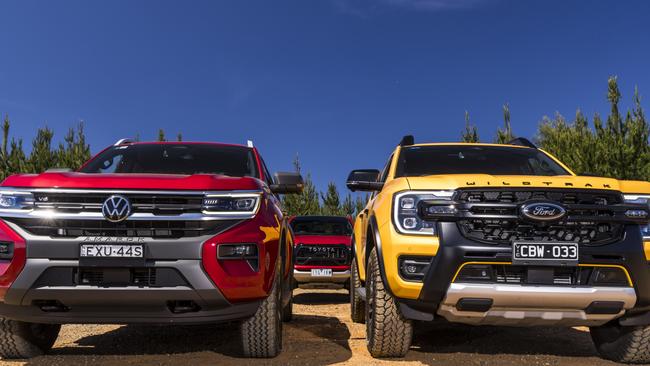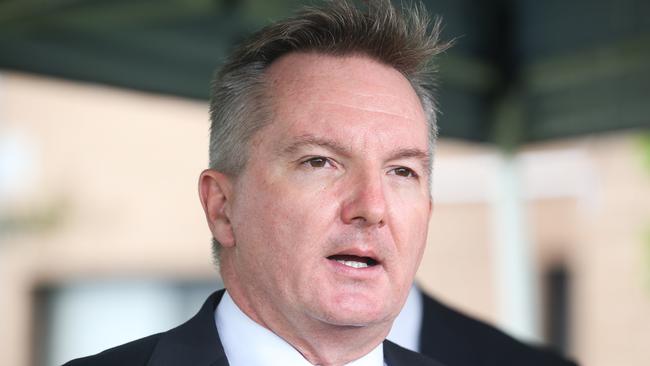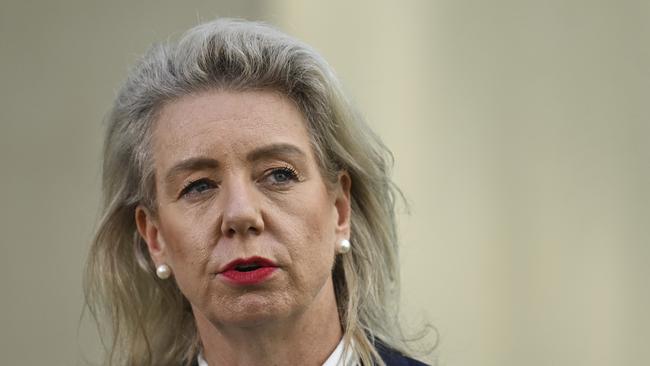Industry rubbishes Labor’s fuel efficiency standards claims on cost and choice as ‘overly optimistic’
Tradies and families risk higher prices and less choice for popular SUVs and utes under Labor’s proposed vehicle pollution caps, the automotive industry has warned.
National
Don't miss out on the headlines from National. Followed categories will be added to My News.
Tradies and families risk higher prices and less choice for popular SUVs and utes under Labor’s proposed vehicle pollution caps, the automotive industry has warned.
The federal government’s claim its new car fuel efficiency standard proposal will not increase costs or restrict options for motorists was rubbished as “overly optimistic,” with questions raised about the true “winners and losers” of each of the three options to improve car standards unveiled for consultation on Sunday.
Labor’s preferred option would impose a fleet-wide cap on average emissions from 2025 and aiming to get the industry in-line with US standards within three years.
Under this proposal no specific models of utes, vans or passenger vehicles would be banned, instead car manufacturers would be penalised if the total emissions of their overall fleet sold in Australia was above the cap threshold, which would be lowered by more than 60 per cent over five years.
Labor has claimed this option will not increase the upfront cost of a car, and released modelling showing consumers would save $1000 a year in fuel from 2028.

But multiple car industry sources questioned how costs would stay the same given a wide range of popular cars in Australia were well above the average CO2 standards, meaning manufacturers would either have to sell less of these sought-after vehicles or cop the penalty.
Ford’s Everest and Ranger models, Nissan’s Patrol and Pathfinder and the Mitsubishi Triton are all in excess of the average standards, according to the government’s Green Vehicle Guide.
Toyota’s Land Cruiser and Prado models would also be above the average standard, as will most makes of its Hilux model.
The Raptor and XL models of the Ford Ranger – the most popular vehicle sold in Australia in 2023 – also sit above the average fuel standard.
Australian Automotive Dealers Association boss James Voortman said consumers ultimately risked facing higher prices, or restricted choice, for these popular models.
“Many utes and SUVs don’t meet the target for next year, let alone the requirements for 2029 – which is more than 60 per cent lower,” Mr Voortman said.
“To suggest that there will be as many options for consumers in the space of five years is overly optimistic.”
Federal Chamber of Automotive Industries chief executive Tony Weber said the target seeking a 60 per cent improvement in emissions was “very ambitious”.
“It will be a challenge to see if they are achievable taking into account the total cost of ownership,” he said.

Energy and Climate Change Minister Chris Bowen said there was a “big range” of fuel efficiency within models of cars and the new standard would give Australians access to the choices available in other countries.
“In United States and even New Zealand, you can get more than 150 models of EV or plug in hybrids, in Australia, less than 100,” he said.
“This is about ensuring Australian families and businesses can choose the latest and most efficient cars and utes, whether they’re petrol and diesel engines, or hybrid, or electric.”
Mr Bowen described the model as a “win-win-win” for motorists, who would also save on fuel costs over time.
Asked what impact the proposal would have on the price of a new car, Transport Minister Catherine King said “none”.

“The international evidence is that it does not have an impact on price,” she said. AAA managing director Michael Bradley has called on the government to be “transparent” about the three scenarios presented for consideration, including the “winners and losers each create”.
“We … want to ensure all Australians can afford to own and operate a car in our vast country with its unique driving conditions,” he said.
The Coalition warned Australians’ favourite vehicles could “soon be unaffordable” if Labor failed to strike the “correct balance” between minimising costs, reducing emissions and maximising choice for consumers.
In a joint statement Opposition transport spokeswoman Bridget Mckenzie and climate change and energy spokesman Ted O’Brien raised concerns about industry representatives being fearful Labor’s “heavy handed approach” would “drive utes off Australian roads”.
“With the price of electric vehicles often tens of thousands of dollars more expensive than the ICE equivalents, it is critical that all costs across the lifespan of a vehicle are considered,” they said.




